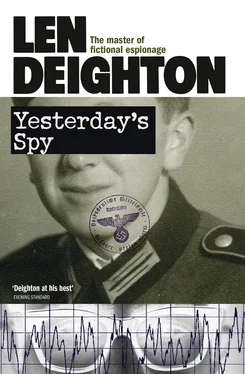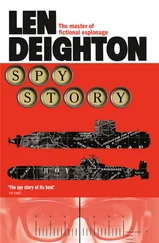Len Deighton - Yesterday’s Spy
Здесь есть возможность читать онлайн «Len Deighton - Yesterday’s Spy» — ознакомительный отрывок электронной книги совершенно бесплатно, а после прочтения отрывка купить полную версию. В некоторых случаях можно слушать аудио, скачать через торрент в формате fb2 и присутствует краткое содержание. Жанр: unrecognised, на английском языке. Описание произведения, (предисловие) а так же отзывы посетителей доступны на портале библиотеки ЛибКат.
- Название:Yesterday’s Spy
- Автор:
- Жанр:
- Год:неизвестен
- ISBN:нет данных
- Рейтинг книги:3 / 5. Голосов: 1
-
Избранное:Добавить в избранное
- Отзывы:
-
Ваша оценка:
- 60
- 1
- 2
- 3
- 4
- 5
Yesterday’s Spy: краткое содержание, описание и аннотация
Предлагаем к чтению аннотацию, описание, краткое содержание или предисловие (зависит от того, что написал сам автор книги «Yesterday’s Spy»). Если вы не нашли необходимую информацию о книге — напишите в комментариях, мы постараемся отыскать её.
Yesterday’s Spy — читать онлайн ознакомительный отрывок
Ниже представлен текст книги, разбитый по страницам. Система сохранения места последней прочитанной страницы, позволяет с удобством читать онлайн бесплатно книгу «Yesterday’s Spy», без необходимости каждый раз заново искать на чём Вы остановились. Поставьте закладку, и сможете в любой момент перейти на страницу, на которой закончили чтение.
Интервал:
Закладка:
To tell you the truth, I thought Dawlish was asking me to confirm that it was a forgery, but you can never take anything for granted when dealing with Dawlish. I dealt him his cards off the top of the deck. ‘Champion is not on the London Diplomatic List,’ I said, ‘but that’s about the only thing I’m certain of.’
Dawlish looked at me and sniffed. ‘Can’t even be certain of that,’ he said. ‘All those Abduls and Ahmeds and Alis … suppose you were told that one of those was the name Champion had adopted when converted to the Muslim faith. What then … ?’
‘It would keep the lawyers arguing for months,’ I said.
‘And what about the Special Branch superintendent at London airport, holding up the aeroplane departing to Cairo? Would he hold a man who was using this as a travel document, and risk the sort of hullabaloo that might result if he put a diplomat in the bag?’
‘No,’ I said.
‘Precisely,’ said Dawlish.
A gust of wind rattled the window panes and the sky grew dark. He said nothing more. I took my coat off and hung it up. It was no good pretending that I wouldn’t be here all day. There’s only one way to tackle those jobs: you do it stone by stone, and you do it yourself. Dawlish sent Blantyre and his associate away. Then he went down to the car and called the office. I began to get some idea of the priorities when he told me he’d cancelled everything for the rest of the day. He sat down on the kitchen chair and watched me work.
There was nothing conclusive, of course: no dismembered limbs or bloodstains, but clothes that I’d seen Melodie Page wearing were packed in plastic carrier-bags, sandwiched neatly between two sheets of plasterboard, sealed at every edge, and integrated beautifully into the kitchen ceiling.
The wallpaper near the bed had deep scratches, and a broken fragment of fingernail remained embedded there. There was the faintest smell of carbolic acid from the waste-trap under the sink, and from there I managed to get a curved piece of clear glass that was one part of a hypodermic syringe. Other than that, there was only evidence of removal of evidence.
‘It’s enough,’ said Dawlish.
From the school yard across the street came all the exuberant screams that the kids had been bottling up in class. It was pouring with rain now, but children don’t mind the rain.
5
Schlegel likes Southern California. Sometimes I think it’s the only thing he does like. You take Southern California by the inland corners, he says, jerk it, so that all the shrubbery and real-estate falls into a heap along the coast, and you know what you’ve got? And I say, yes, you’ve got the French Riviera, because I’ve heard him say it before.
Well, on Monday I’d got the French Riviera. Or, more precisely, I’d got Nice. I arrived in my usual neurotic way: ten hours before schedule, breaking my journey in Lyon and choosing the third cab in the line-up.
It was so easy to remember what Nice had looked like the first time I saw it. There had been a pier that stretched out to sea, and barbed wire along the promenade. Armed sentries had stood outside the sea-front hotels, and refugees from the north stood in line for work, or begged furtively outside the crowded cafés and restaurants. Inside, smiling Germans in ill-fitting civilian suits bought each other magnums of champagne and paid in mint-fresh military notes. And everywhere there was this smell of burning, as if everyone in the land had something in their possession that the Fascists would think incriminating.
Everyone’s fear is different. And because bravery is just the knack of suppressing signs of your own fear, bravery is different too. The trouble with being only nineteen is that you are frightened of all the wrong things; and brave about the wrong things. Champion had gone to Lyon. I was all alone, and of course then too stupid not to be thankful for it. No matter what the movies tell you, there was no resistance movement visible to the naked eye. Only Jews could be trusted not to turn you over to the Fascists. Men like Serge Frankel. He’d been the first person I’d contacted then, and he was the first one I went to now.
It was a sunny day, but the apartment building, which overlooked the vegetable market, was cold and dark. I went up the five flights of stone stairs. Only a glimmer of daylight penetrated the dirty windows on each landing. The brass plate at his door – ‘Philatelic Expert’ – was by now polished a little smoother, and there was a card tucked behind the bell that in three languages said ‘Buying and Selling by Appointment Only’.
The same heavy door that protected his stamps, and had given us perhaps groundless confidence in the old days, was still in place, and the peep-hole through which he’d met the eyes of the Gestapo now was used to survey me.
‘My boy! How wonderful to see you.’
‘Hello, Serge.’
‘And a chance to practise my English,’ he said. He reached forward with a white bony hand, and gripped me firmly enough for me to feel the two gold rings that he wore.
It was easy to imagine Serge Frankel as a youth: a frail-looking small-boned teenager with frizzy hair and a large forehead and the same style of gold-rimmed spectacles as he was wearing now.
We went into the study. It was a high-ceilinged room lined with books, their titles in a dozen or more languages. Not only stamp catalogues and reference books, but philosophy from Cicero to Ortega y Gasset.
He sat in the same button-back leather chair now as he had then. Smiling the same inscrutable and humourless smile, and brushing at the ash that spilled down the same sort of waistcoat, leaving there a grey smear like a mark of penitence. It was inevitable that we should talk of old times.
Serge Frankel was a Communist – student of Marx, devotee of Lenin and servant of Stalin. Born in Berlin, he’d been hunted from end to end of Hitler’s Third Reich, and had not seen his wife and children since the day he waved goodbye to them at Cologne railway station, wearing a new moustache and carrying papers that described him as an undertaker from Stettin.
During the Civil War in Spain, Frankel had been a political commissar with the International Brigade. During the tank assault on the Prado, Frankel had destroyed an Italian tank single-handed, using a wine bottle hastily filled with petrol.
‘Tea?’ said Frankel. I remembered him making tea then as he made it now: pouring boiling water from a dented electric kettle into an antique teapot with a chipped lid. Even this room was enigmatic. Was he a pauper, hoarding the cash value of the skeleton clock and the tiny Corot etching, or a Croesus, indifferent to his plastic teaspoons and museum postcards of Rouault?
‘And what can I do for you, young man?’ He rubbed his hands together, exactly as he had done the day I first visited him. Then, my briefing could hardly have been more simple: find Communists and give them money, they had told me. But most of life’s impossible tasks – from alchemy to squaring the circle – are similarly concise. At that time the British had virtually no networks in Western Europe. A kidnapping on the German–Dutch border in November 1939 had put both the European chief of SIS and his deputy into the hands of the Abwehr. A suitcase full of contact addresses captured in The Hague in May 1940, and the fall of France, had given the coup de grâce to the remainder. Champion and I were ‘blind’, as jargon has it, and halt and lame, too, if the truth be told. We had no contacts except Serge Frankel, who’d done the office a couple of favours in 1938 and 1939 and had never been contacted since.
‘Communists.’ I remembered the way that Frankel had said it, ‘Communists’, as though he’d not heard the word before. I had been posing as an American reporter, for America was still a neutral country. He looked again at the papers I had laid out on his writing table. There was a forged US passport sent hurriedly from the office in Berne, an accreditation to the New York Herald Tribune and a membership card of The American Rally for a Free Press, which the British Embassy in Washington recommended as the reddest of American organizations. Frankel had jabbed his finger on that card and pushed it to the end of the row, like a man playing patience. ‘Now that the Germans have an Abwehr office here, Communists are lying low, my friend.’ He had poured tea for us.
Читать дальшеИнтервал:
Закладка:
Похожие книги на «Yesterday’s Spy»
Представляем Вашему вниманию похожие книги на «Yesterday’s Spy» списком для выбора. Мы отобрали схожую по названию и смыслу литературу в надежде предоставить читателям больше вариантов отыскать новые, интересные, ещё непрочитанные произведения.
Обсуждение, отзывы о книге «Yesterday’s Spy» и просто собственные мнения читателей. Оставьте ваши комментарии, напишите, что Вы думаете о произведении, его смысле или главных героях. Укажите что конкретно понравилось, а что нет, и почему Вы так считаете.












